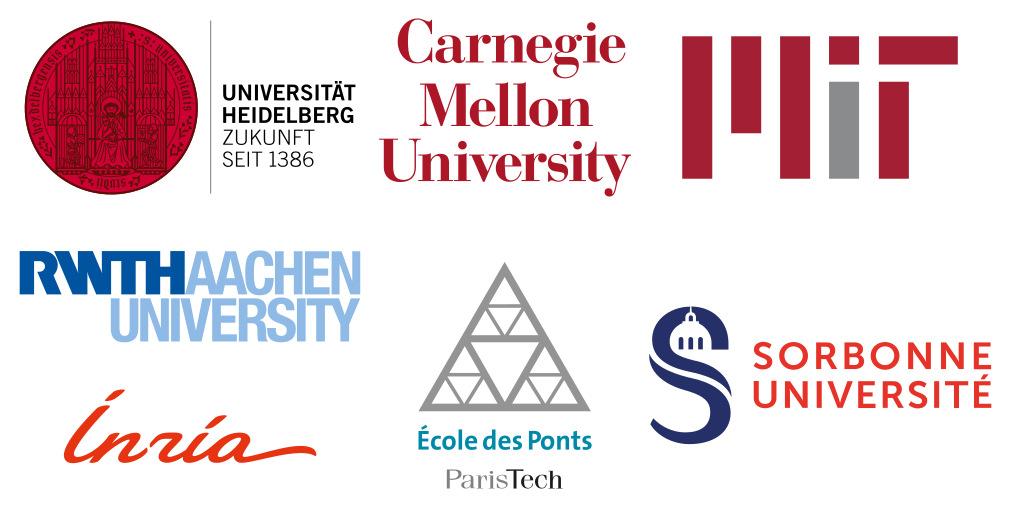Collaborations
My collaborations span across the disciplines and include application scientists, mathematicians and computer scientists alike. Recently I have joint multiple interdisciplinary research initiatives in which I take a mediating role between the involved communities, for example by providing interdisciplinary software platforms, such as the Density-Functional ToolKit (DFTK), in which our efforts can be bundled in one code base.

Member in cross-departmental initiatives
-
Center for Exascale Simulation of Material Interfaces in Extreme Environments, Massachusetts Institute of Technology.
Research initiative advancing state-of-the-art first-principle simulations by connecting method development with (a) advances in programming languages, compiler technologies and performance engineering tools and (b) underpinning them with rigorous approaches to statistical inference and uncertainty quantification (UQ). On the former aspect I collaborate with the JuliaLab of Alan Edelman to developing a composable automatically differentiable software for molecular dynamics simulations and on the latter with the group of Youssef Marzouk on uncertainty quantification in first-principles simulations. -
Accelerated Computational Electrochemical systems Discovery, Carnegie Mellon University, Julia Computing and Citrine Informatics.
Project centred around discovering novel materials for electrochemical catalysis and lithium batteries based on high-throughput screening. The developed workflow includes novel numerical methods, surrogate modelling for electrocatalytic reaction networks, advances in data warehousing and analysis and the integration of automatised experimental pipelines. I collaborate with the group of Venkat Viswanathan on developing a first-principles screening pipeline for novel battery electrolytes. -
Extreme-scale Mathematically-based Computational Chemistry, Sorbonne University, Inria Paris and École des Ponts ParisTech.
Interdisciplinary initiative to advance the state of the art in first-principle simulations by integrating recent advances in numerical linear algebra (e.g. low-rank factorisations, randomised methods, GPU acceleration) and numerical analysis (e.g. a posteriori error estimation) into state-of-the-art molecular-dynamics and electronic-structure methods. Continuing from my PostDoc I participate in the development of black-box density-functional theory methods and a posteriori error estimates, mainly working with Eric Cancès and Antoine Levitt.
Key collaborators
The topic of collaboration is sketched by a few keywords in each case.
- Eric Cancès (Numerical analysis, École des Ponts ParisTech):
A posteriori error analysis for electronic-structure simulations. - Andreas Dreuw (Theoretical chemistry, Heidelberg University): Computational spectroscopy based on algebraic-diagrammatic construction methods.
- Mi-Song Dupuy (Numerical analysis, Sorbonne University):
Anderson acceleration methods for self-consistent field problems. - Alan Edelman (Computer science, Massachusetts Institute of Technology): Modern software development techniques for electronic-structure simulations / data-driven molecular dynamics.
- Thomas Fransson (Theoretical chemistry, KTH Stockholm):
Core-valence separation approximation and core-level spectroscopy. - Youssef Marzouk (Uncertainty quantification, Massachusetts Institute of Technology): Uncertainty quantification in density-functional theory.
- Agnieszka Miedlar (Numerical analysis, University of Kansas):
Acceleration methods for non-linear eigenvalue problems. - Antoine Levitt (Numerical analysis, Inria Paris):
Reliable black-box algorithms for electronic structure simulations. - Uwe Naumann (Computer science, RWTH Aachen University):
Algorithmic differentiation in DFTK / density-functional theory simulations. - Wouter Ryssens (Nuclear physics, Free University of Brussels):
Numerical methods for nuclear density-functional theory. - Erik Tellgren (Theoretical chemistry, University of Oslo):
Numerical techniques to discover global minima in SCF methods. - Venkat Viswanathan (Mechanical engineering, Carnegie Mellon University): Computational discovery of novel lithium battery materials.
